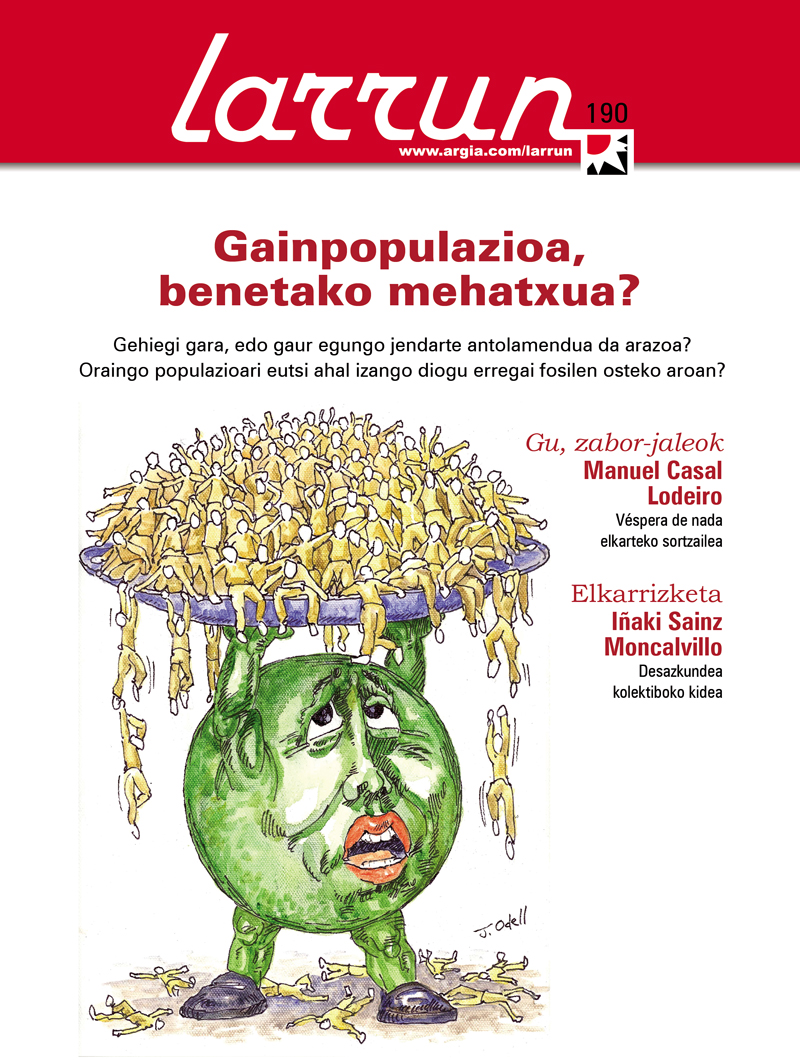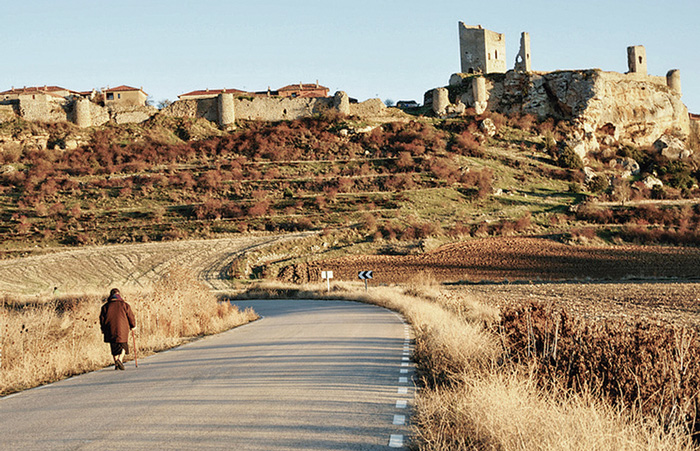Are we about to overflow?
- Is there a demographic crisis? Many believe it is. In particular, they regard population growth as an important component of the global crisis (energy, ecological, climate, …); the stabilisation of the human population, and growth in reduction, is therefore one of the steps to be taken to address this global crisis. Although, within environmentalism, the “demographic aspect” of the problem remains important. The deterioration of the environment and waste of resources is not due to the number of people, but to the practice of a very small minority of these people. This is believed, for example, by the militant for Degrowth Iñaki Sainz Moncalvillo, interviewed in the last pages of LARRUN; although he recognizes that the population must have some limit, Sainz claims that if the goods are well distributed there is room for us and even more so. Before your words, you will find the article by Manuel Casal Lodeiro. The view of Casal is very different: it directly relates the population explosion of the last century to the availability of fossil fuels, which is why a population growth is announced when these fuels are exhausted. Very low.

While writing these lines, the journalist is looking at the web data www.worldometers.info. The first is the human population in the world; the figure is changing sharply, in an unstoppable upward trend. The website says there are 7,261,522,000 people, clearer than before you've read this. On the verge of reaching the symbolic figure of 7 billion, in 2011, the UN announced that we would reach 10 billion by 2100. In 2013, the international organization has increased its predictions by noting that “fertility is higher than expected”: it is estimated that by 2050 there will be about 9.6 billion human beings, and the greatest growth will occur in undeveloped and developing regions.
Too many people? There are different views. Iñigo Antepara, member of the collective Desazkundea, believes that it is not the most appropriate to measure the environmental impact trying to keep the number of inhabitants without more, since the impact of each person is not the same. Stephen Pacala, a researcher at the Princeton Environmental Institute, said at a prestigious conference that “the amount of greenhouse gases emitted by the world’s 3,000 million poorest people is zero.” Are Simon Butler and Ian Angus, Too many people going down that road? (Too many people?) Authors of the book. In an article published on the web Grist.org, populationist groups “care about 7 billion, but environmental destruction is only responsible for 1% of the population.” The owners of the big multinationals.
The arguments of Batler and Angus were answered by the writer and politician John Andrews in the context of an intense debate in writing. Basically, he said that multinationals would not cause so much destruction if the number of consumers were not so high. Andrews believes that overpopulation should be the first factor in climate change in the ranking of factors influencing climate change.
In the aforementioned article, Simon Butler and Ian Angus say: “Those of us who criticize the slogan Too many people, we often have to hear that we reject the limits of growth. In our case, that is not true. What we say is that in an ecologically and socially just world, where large families are not an economic need, the population is going to stabilize.”
Laurie Mazur, a specialist in population issues, is of the same opinion. Women’s rights are the key to the article we could translate to slow population growth, Mazur says: “I do not believe that there is an ideal measure of the human population: expanding equality and more efficient use of resources will increase the burden capacity of the planet. In any case, the figure of EUR 8 billion seems more sustainable than the figure of EUR 16 billion. Fortunately, we know how to slow population growth: giving all people the real opportunity to choose about becoming parents. Where women’s fundamental rights are respected, the most common are the smallest (and healthiest) families.”
Hurrengo urtean India izango da munduko herrialderik populatuena, Txinaren aurretik; datorren azarorako, 8.000 milioi herritar izango ditu planetak; zortzi herrialdetan kontzentratuko da biztanleriaren hazkunderik handiena; baina oro har jaiotze tasa txikitzen eta biztanleria... [+]
Galiziarra da Manuel Casal Lodeiro, Barakaldon jaioa izanagatik (1970). Véspera de nada / Asociación por unha Galiza sen petróleo (Ezer ezen bezpera / Petroliorik gabeko Galiziaren aldeko elkartea) taldearen sortzaileetako bat da. Petrolioaren gailurrari... [+]














